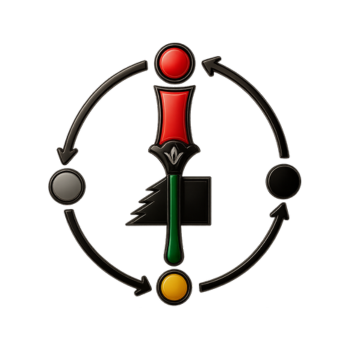-
“The Diasporic African, in his or her being, represents the embodiment of the confrontation of two divergent world-views: a spiritual ethos inheriting a sacred, cosmic world-view forced to adjust to a materialistic society in inhuman circumstance. We must raise again the question of what happens when the spiritual ethos of a people of African origin is entrapped, injured, abused, raped and exploited by an oppressive, materialistic society whose culture seeks to dominate them. Do they lose their integrity? Does their ethos and world-view become distorted so that they are no longer recognizable as African? Do they indeed become Europeans? Or is it possible that a legacy of powerful spiritual conceptions gives them the ability to revitalize themselves in spite of great suffering and imminent devastation?”
— Marimba Ani, “Let The Circle Be Unbroken: The Implications of African Spirituality in the Diaspora.”
I find this very prescient. It it something I have noticed another other African diasporans, especially those of us who are descendants of victims of the slave trade, feel a real alienation from Africa. They are Black, they are of African origin, but they often don’t associate themselves with Africa or other Africans in the diaspora. Since many of us do not know our specific African origin, in terms of ethnic group and language, I’ve noticed that there is real anxiety among diasporans about claiming Africa with pride. Even some of the most progressive, radical Africans I know often don’t associate themselves with Africa and these are people who often talk about “revolution” and “decolonization.” I rarely hear them put Africa and Africanization on the table as a form of decolonization. In my opinion, African culture (especially music, dance, and language) and spirituality play a huge role in reconnecting the African diaspora with Africa but it can often be a chore to make people take Africa, in general, seriously. What I have noticed is that there are some African diasporans who are curious about Africanization and Pan-Africanism but don’t know where to start. Then there are others who just want to be Americans, Spaniards, Latins, Frenchmen, or Portuguese/Brazilian people with Black skin and African ancestry; they want to be more European than African. But, to Ani’s point, they are embracing a world-view that is fundamentally destructive to them. Anyway, I just wanted to share some thoughts.
8 Comments-
Some Diasporans feel it is not economically feasible to see themselves as Afrikans.
-
That’s because they don’t know that the western countries that criminalize, murder and imprison them and their children, have been stealing their birthright from Africa, all along and plan to continue for centuries. They need that information, it may make a difference.
-
-
Unfortunately what gets lost in the discourse are all the ways in which diasporic Africans (especially in the U.S.) express our ancestry in everyday life. How we congregate as families, our influence on the religions that were forced on us, even how we talk. Despite the best effort of wazungu, that connection was never fully erased.
-
Yes, there are major African Survivals in the Diaspora. One reason many Diasporic Africans practice the Christian Baptist religion is due to its emphasis on the symbolic importance of water. Water was a revered symbol among the ancient Kemetic , Nubian, and Yoruba people.
-
That is something I like to bring up. I’m a musician and I often tell people about the African roots and cultural tensions in African-American music like blues and jazz. You’re right, the connection was never fully erased.
-
-
They become manufactured negros, living in an unnatural state, some of us already reclaimed our lost identities, most can’t. They bought into the unnaturalness and facade of the west and now are too far gone to reconnect to our ancestors. They fight you down if you try to put them back on the path to wholesomeness. That’s the colonizer’s weapon now, the destructive manufactured negro who didn’t know that colonizers continued robbing the continent to pretend wealth and supremacy over them.
-
self-hate was weaponized and instilled in the African psyche and spirituality was brutally beaten out. Even those of us who retained our African spirituality through pure instinct, because we knew nothing, were badly traumatized and injured.
-
 121,038
Abibisika (Black Gold) Points
To her question “We must raise again the question of what happens when the spiritual ethos of a people of African origin is entrapped, injured, abused, raped and exploited by an oppressive, materialistic society whose culture seeks to dominate them.” we can simply look outside to see the answer to this one. What we see is what happens in the context she recognizes.
121,038
Abibisika (Black Gold) Points
To her question “We must raise again the question of what happens when the spiritual ethos of a people of African origin is entrapped, injured, abused, raped and exploited by an oppressive, materialistic society whose culture seeks to dominate them.” we can simply look outside to see the answer to this one. What we see is what happens in the context she recognizes.
-

